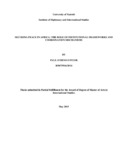| dc.description.abstract | The creation of the African Union (AU) from the Organization of African Unity (OAU) was necessitated by, among other things, the growing concern to secure peace and security for there to be meaningful socio-political and economic development in Africa. In this regard, the AU created institutional frameworks to ensure a holistic approach to enhance peace and security in Africa. Despite various initiatives by the AU to secure peace in Africa, incidents of violent conflicts continue to persist in the continent. The general objective of this study was to examine and analyze the role of institutional frameworks and coordinating mechanisms in securing peace in Africa with a view to proposing some recommendations. The theory of regionalization of security was used in the study. A proper analysis of the regional dimension of security which starts from regionalization of security and which allows regional activities to be analyzed closely and the region itself becoming a unit of analysis was highlighted. A qualitative method of research was utilized and both structured mailed questionnaires and structured and semi-structured oral interview schedules were used in gathering data. The study findings revealed that the effectiveness of AU in securing peace in Africa varied. The AU has made important strides in discharging its mandate in securing peace in Africa through effecting normative, structural and institutional changes. It has put in commendable efforts in reducing the number of violet conflicts in Africa. But there are loopholes which hinder the AU from achieving comprehensive success in its operations. The key areas yet to click include funding and resource mobilization, decision making, resolve to solve African problems, political commitment, making the member states comply with its decisions and staffing. Overall finding of the study is that the AU has built-in institutional frameworks and coordinating mechanisms to become effective and efficient in securing peace in Africa but its conflict management depends largely on whether its members want it to be effective. For now, it faces challenges which can only be overcome with extensive external support. Some of the challenges faced by AU in its peace and security initiatives can be addressed in terms of the recommendations put forward in this study. | en_US |



